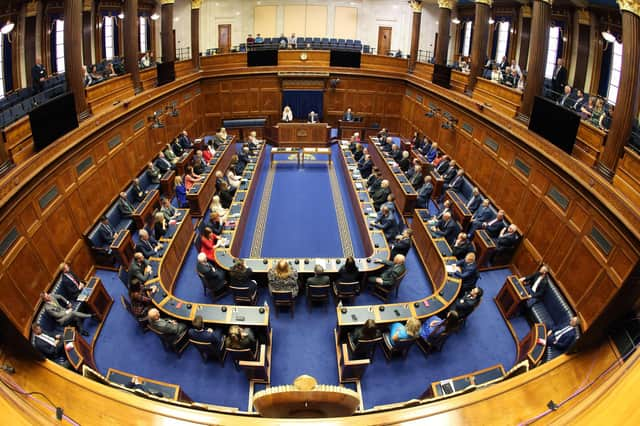Belfast Agreement @25: I was at school in 1998, now I want to help protect the deal - Claire Sugden


Stormont and its periods of instability are often derided by a typically irreverent Northern Ireland sense of humour. While this is understandable, the current absence of government and deterioration of our public services are in fact extremely serious, despite the solution to them being well within our grasp. The solution resides within the agreement recently celebrated and the institutions it created.
Twenty-five years ago, I was still at school. But the importance of the agreement was clear – not just to bring an end to the conflict but to provide a better future for young people just like me. I feel like I owe much to those who delivered it, and now a responsibility to protect it and use its foundations to offer the best possible future for today’s young people.
Advertisement
Hide AdAdvertisement
Hide AdAt that time, a quarter of a century ago, locally elected politicians not only brought to an end an even longer period of conflict, they also brought power back into the hands of the people of Northern Ireland. The importance of this cannot be overstated. Locally elected assembly members and ministers are far better placed to understand the issues and solutions needed here, and know they won’t be re-elected if they don’t perform well.
Contrast this with the alternative of politicians elected in other parts of the UK. They face no electoral repercussions and have inherently far less interest in improving services when they could be saving their bosses money. No-one else is going to do the things we need for us. For anyone desirous of a return to direct rule, I would say be careful what you wish for.
The Northern Ireland Office is already questioning Stormont-led policies that help the most vulnerable here, such as free domestic water, prescriptions, transport for the elderly and home care. The far lower prices that students from Northern Ireland pay when they study here compared to Great Britain are also being examined.
Only a government here can prevent short-sighted and damaging decisions being made – ones that could take many years to reverse. Only locally elected representatives can stop the deterioration of public services – and Northern Ireland in general – as we move forward from the 25th anniversary of the Agreement.
Advertisement
Hide AdAdvertisement
Hide AdThe conflict is over and so too should our 25-year post-conflict period be, where differences can often outweigh commonality. We must now enter a new period where, through consent and democracy, we use the institutions we have to make a real difference to the lives of everyone here by improving the public services of healthcare, education, justice, childcare, social care and so on.
If this sounds idealistic or naïve, then it shouldn’t. We have the tools and institutions to create hugely positive change for everyone in Northern Ireland. We just need the right people with the right skills in the right jobs. I believe we have that – if only those people choose to do so.
Our question should be ‘what can we achieve in our current context?’ rather than resisting any kind of change – even that which benefits everyone here. We have to recognise the opportunities of remaining within the UK, having access to both the UK and EU markets, and also being a part of another island. Rather than division we should see opportunity.
We must always recognise and appreciate that our system of mandatory coalition is different from many other democracies, and that a certain instability is inherent in any coalition. We see this in coalition governments across the world. The difference must be our appreciation of the compromise and unity required to make it work, not to mention our experience and the knowledge that the positives of Stormont exponentially dwarf the negatives.
Advertisement
Hide AdAdvertisement
Hide AdDespite the three years’ absence of the previous mandate, what was achieved in the remaining two years showed what could be accomplished when ministers and the assembly work – if not always in total agreement – but positively and cordially.
This should be seen as the tip of the iceberg in terms of potential. Now with the ability to set three-year budgets, and with a full five years’ consistent government, we could see the long-overdue reform of our health and social care service, the protection of our education system, greater provision of childcare for working parents and the filling of gaps in our laws, such as an age discrimination act.
The potential is as vast as it is exciting. I have been honoured to be a part of the assembly for nearly 10 years, including my time as an executive minister. People often ask why I became a politician and I always say ‘to make Northern Ireland a better place for everyone here’. I believe this motivation exists for all 90 of Stormont’s elected MLAs. What we all have to do now is prove it.
• Claire Sugden is an independent East Londonderry MLA and former justice minister